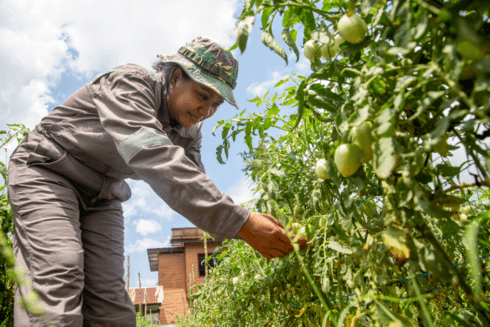
With the endorsement of the IDB's Caribbean Governors, this regional program aims to address central challenges with a regional focus.
ONE Caribbean is the IDB Group’s strategic framework for addressing shared challenges, including climate adaptation, disaster risk management, citizen security, private sector development, and food security, while strengthening institutions and promoting digital transformation. We are ONE Caribbean.
Watch to learn how the IDB Group is working with governments and partners to help build a safer, more resilient, and more prosperous future for the Caribbean.

ONE Caribbean is the IDB Group's comprehensive, regional approach to promoting sustainable development in the Caribbean and Small Island Developing States. ONE Caribbean recognizes the common challenges facing the region and seeks to address them through a territorial focus and a coordinated, regional approach that leverages resources, cooperation, and economies of scale. It is also embedded in the commitments of the IDB Group's Institutional Strategy, IDBStrategy+. The beneficiaries of ONE Caribbean are Barbados, Belize, Guyana, Jamaica, Suriname, the Bahamas, and Trinidad and Tobago.

The Caribbean benefits from many opportunities but also faces significant challenges. Economic growth has been low, averaging less than 1% per year in the decade before the pandemic, compared to more than 5% for all emerging and developing countries. Low productivity reflects a lack of economies of scale, dependence on imports for energy and other inputs with volatile prices, frequent natural disasters, and domestic challenges such as labor-skill mismatches and security issues. Moreover, individual nations are small and vulnerable to increasingly frequent natural disasters.

The Caribbean is highly dependent on food imports. Prices are both high, with substantial logistical costs, and uncertain, given the high volatility in international prices. Improvements in domestic agricultural production and better trade facilities would help reduce costs while seeking ways to hedge international price volatility could reduce risks, allowing greater access to nutritious food for all.

The Caribbean is highly exposed to tropical storms and hurricanes, which are increasing in frequency and intensity, along with heat waves, droughts, and floods. To address these challenges, countries need more resilient infrastructure and increased use of renewable energy.

For more than a decade, public security has consistently been ranked by citizens as the most serious social problem faced by their respective countries. This issue not only affects public safety, but also domestic violence. Security issues place a tax on businesses, that must devote resources for prevention and pay the cost when incidents occur.

Low growth rates in the Caribbean reflect low rates of investment and low productivity. The region, characterized by a few large enterprises and small and medium-sized companies, faces bottlenecks to increase productivity gains. Greater integration would yield scale and harness the varied capabilities across the region helping to spur private sector engagement.

The Caribbean is highly dependent on food imports. Prices are both high, with substantial logistical costs, and uncertain, given the high volatility in international prices. Improvements in domestic agricultural production and better trade facilities would help reduce costs while seeking ways to hedge international price volatility could reduce risks, allowing greater access to nutritious food for all.

The Caribbean is highly exposed to tropical storms and hurricanes, which are increasing in frequency and intensity, along with heat waves, droughts, and floods. To address these challenges, countries need more resilient infrastructure and increased use of renewable energy.

For more than a decade, public security has consistently been ranked by citizens as the most serious social problem faced by their respective countries. This issue not only affects public safety, but also domestic violence. Security issues place a tax on businesses, that must devote resources for prevention and pay the cost when incidents occur.

Low growth rates in the Caribbean reflect low rates of investment and low productivity. The region, characterized by a few large enterprises and small and medium-sized companies, faces bottlenecks to increase productivity gains. Greater integration would yield scale and harness the varied capabilities across the region helping to spur private sector engagement.
In addition to these four priorities, strengthening institutions and digital transformation emerge as cross-cutting issues, as good institutions and technology are necessary conditions for project success.
Strengthening technical capabilities and institutional capacity will contribute, among other issues, to building the local technical expertise necessary to implement impactful projects in the Caribbean.
Digitalization of the public sector lowers the private sector’s cost of interacting with the government, by facilitating e-government initiatives to improve ease of doing business. It can also improve transparency and accountability by providing greater citizen access to information.

- Regional project preparation facility
- Partnerships and resource mobilization
These enabling mechanisms will facilitate the implementation of ONE Caribbean. Specifically, the project preparation facility will catalyze private and public investment, including the reform of institutional and regulatory frameworks. This facility will help harmonize project structuring, promote standardization, reduce transaction costs, and increase transparency.

Increasing development impact in the region is a core principle of ONE Caribbean. Among the most important expected results of ONE Caribbean are:
- Improved disaster preparedness and greater access to resilient infrastructure across the region.
- Safer communities through crime prevention.
- Enhanced investment and productivity through private-sector engagement.
- Improved access to healthy and nutritious food.
The Project Preparation Coordination Mechanism (PPCM) is designed to help governments, state-owned enterprises, and private-sector partners across the region identify, structure, and advance high-impact projects that can attract financing and deliver real results.
We have a new approach that unifies and focuses the work of the IDB, IDB Invest and IDB Lab under one goal.
A holistic umbrella program for the sustainable development of the region, which aims to work together on forest and climate conservation and to improve people's quality of lives, offering economic alternatives.
Businesses worldwide can unlock billions in untapped economic opportunities across the region by leveraging the IDB’s experience, networks, and commitment to transparency, equality, governance, and sustainability.
The program to bolster integration, resilience and social development in Central America and the Dominican Republic.











